The Best Fluffy Pancakes recipe you will fall in love with. Full of tips and tricks to help you make the best pancakes.
If you’re looking for a delicious and nutritious way to boost your energy levels, a salad recipe high in vitamin B is the perfect choice! Vitamin B plays a crucial role in energy production, brain function, and metabolism, making it an essential nutrient for a healthy lifestyle. Fortunately, many fresh and wholesome ingredients—like leafy greens, lean proteins, whole grains, and nuts—are packed with different B vitamins to keep you feeling energized and nourished.
In this post, we’ll explore the best vitamin B-rich ingredients, the health benefits of incorporating them into your diet, and a simple, tasty salad recipe you can prepare in minutes. Whether you’re looking to support your metabolism, improve focus, or simply enjoy a nutrient-packed meal, this easy-to-make vitamin B salad has you covered!
Why Vitamin B is Essential for Your Health
Vitamin B is a group of eight essential nutrients known as B-complex vitamins, each playing a key role in maintaining overall health. These vitamins help convert food into energy, support brain function, and contribute to the production of red blood cells. Since vitamin B is water-soluble, the body does not store it in large amounts, meaning you need to consume it regularly through food to maintain optimal health.
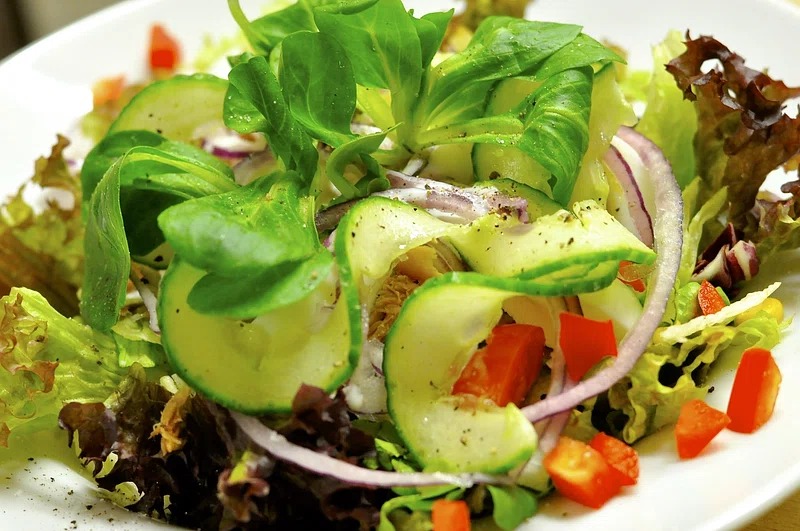
Here’s why vitamin B is crucial for your well-being:
1. Supports Energy Production and Metabolism
One of the primary roles of vitamin B is to help your body break down carbohydrates, proteins, and fats into usable energy. B vitamins like B1 (thiamine), B2 (riboflavin), B3 (niacin), and B5 (pantothenic acid) are directly involved in the metabolic process. Without enough vitamin B, you may feel fatigued, sluggish, and experience a lack of focus.
2. Essential for Brain Function and Mental Clarity
Vitamin B is often referred to as the “brain vitamin” because it plays a crucial role in cognitive function, memory, and mood regulation.
- Vitamin B6 (pyridoxine) helps produce neurotransmitters like serotonin and dopamine, which influence mood and stress levels.
- Vitamin B12 (cobalamin) is essential for nerve function and preventing cognitive decline.
- A deficiency in B vitamins can lead to brain fog, difficulty concentrating, and even depression.
3. Helps with Red Blood Cell Formation and Prevents Anemia
Vitamin B12 and folate (B9) are necessary for producing healthy red blood cells, which transport oxygen throughout the body. A deficiency in these vitamins can lead to anemia, causing symptoms such as:
- Extreme tiredness
- Dizziness
- Shortness of breath
- Pale skin
People who follow a vegan or vegetarian diet are at higher risk of B12 deficiency, as it is primarily found in animal products. Adding fortified foods, eggs, dairy, and leafy greens to your diet can help prevent deficiencies.
4. Supports Healthy Skin, Hair, and Digestion
B vitamins also contribute to healthy skin, hair growth, and proper digestion:
- Vitamin B7 (biotin) helps strengthen hair and nails while keeping the skin hydrated.
- Vitamin B2 (riboflavin) and B3 (niacin) improve skin elasticity and reduce inflammation.
- B vitamins aid digestion by promoting the production of digestive enzymes and maintaining gut health.
5. Found in a Variety of Nutritious Foods
The good news is that vitamin B is naturally found in many healthy, whole foods. Some of the best dietary sources include:
- Leafy greens (spinach, kale, romaine) – high in folate (B9)
- Legumes & whole grains (quinoa, lentils, chickpeas) – rich in B6 and B1
- Lean proteins (chicken, salmon, eggs, tuna) – excellent sources of B12
- Dairy products (cheese, yogurt, milk) – provide B2 and B12
- Nuts & seeds (almonds, sunflower seeds, flaxseeds) – packed with B vitamins and healthy fats
By incorporating these nutrient-dense foods into your diet—especially in a fresh, vitamin B-rich salad—you can enjoy sustained energy, better focus, and improved overall health.
Top Vitamin B-Rich Ingredients for a Nutritious Salad
A well-balanced salad high in vitamin B should include a variety of fresh, whole ingredients that provide B-complex vitamins for energy, metabolism, and overall well-being. By combining leafy greens, lean proteins, whole grains, nuts, and healthy fats, you can create a delicious and nutrient-packed meal that supports your health.
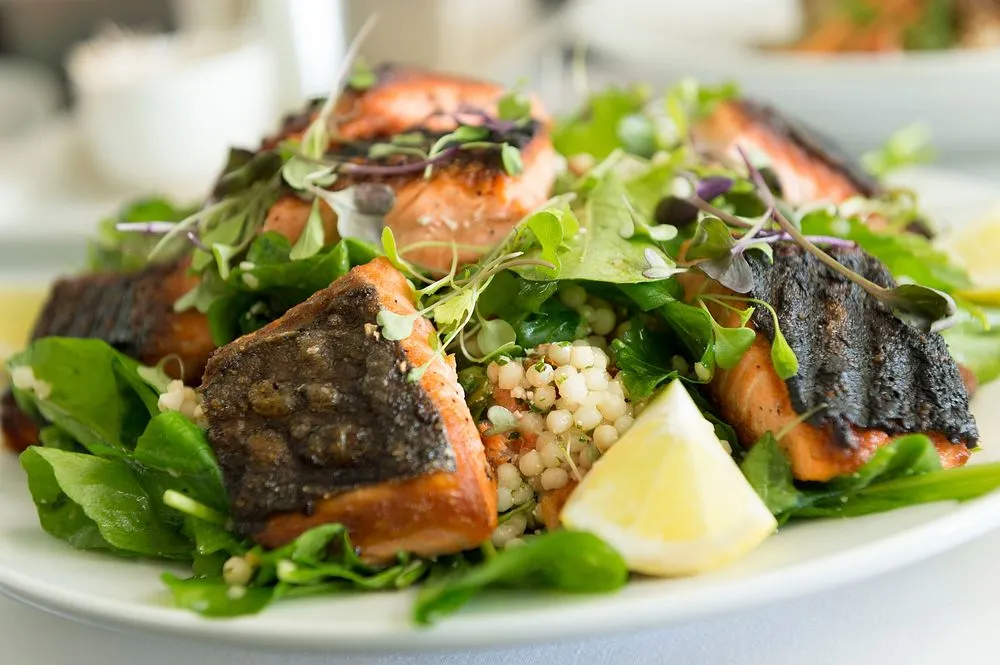
Here are some of the best vitamin B-rich ingredients to include in your salad:
1. Leafy Greens: A Natural Source of Folate (B9)
Leafy greens are some of the best sources of folate (vitamin B9), an essential nutrient for red blood cell formation, DNA synthesis, and brain function. They also provide fiber, antioxidants, and minerals that support digestion and heart health.
Top Vitamin B-rich leafy greens for your salad:
- Spinach – High in folate and iron, great for boosting energy levels.
- Kale – Packed with folate, vitamin C, and fiber for overall wellness.
- Romaine lettuce – A lighter option, rich in folate and hydration.
- Swiss chard – Contains folate, magnesium, and antioxidants.
How to use them: As a salad base, mix different greens for a variety of textures and flavors.
2. Lean Proteins: Rich in Vitamin B12 & B6
Protein is essential for muscle repair, immune function, and energy production. Many animal-based proteins are excellent sources of B12 (cobalamin), B6 (pyridoxine), and B3 (niacin)—all crucial for brain function and metabolism.
Best vitamin B-rich protein options for your salad:
- Grilled chicken – A lean source of B6 and niacin, promoting energy production.
- Salmon or tuna – High in B12, B6, and omega-3 fatty acids for brain and heart health.
- Hard-boiled eggs – A great source of B12 and biotin (B7) for skin, hair, and digestion.
- Tofu or tempeh – Plant-based alternatives rich in B vitamins, especially B6 and B3.
How to use them: Slice grilled chicken, flake cooked salmon, or add chopped hard-boiled eggs for extra protein.
3. Whole Grains & Legumes: High in B1, B6, and B9
Whole grains and legumes are excellent plant-based sources of B1 (thiamine), B6, and B9 (folate). They also add fiber and complex carbohydrates, keeping you full and energized.
Best whole grains & legumes for a vitamin B-packed salad:
- Quinoa – A complete protein with B6 and folate, great for plant-based diets.
- Lentils – Loaded with folate and iron, excellent for heart health.
- Chickpeas – A fantastic source of B6 and fiber, helping digestion.
- Black beans – Rich in B1 and folate, supporting brain and nerve function.
How to use them: Cook quinoa and let it cool before adding it to the salad, or toss in a handful of chickpeas or lentils for a hearty texture.
4. Nuts & Seeds: Packed with B Vitamins & Healthy Fats
Nuts and seeds provide a powerful combination of B vitamins, protein, and healthy fats that support energy levels, brain function, and glowing skin.
Best nuts & seeds for a vitamin B-rich salad:
- Sunflower seeds – High in B5 (pantothenic acid) and B6, great for metabolism.
- Almonds – Contain riboflavin (B2) and niacin (B3), supporting energy production.
- Flaxseeds & chia seeds – Rich in B vitamins and omega-3s, promoting brain and heart health.
- Pumpkin seeds – Provide B vitamins, magnesium, and zinc for overall wellness.
How to use them: Sprinkle a handful of toasted almonds, sunflower seeds, or flaxseeds for a crunchy texture and added nutrients.
5. Tropical Ingredients: A Refreshing Source of B Vitamins
Tropical ingredients bring not only vibrant flavors but also a variety of essential B vitamins that support digestion, energy production, and overall wellness.
Best tropical ingredients for a vitamin B-rich salad:
- Cabbage – High in folate (B9) and fiber, supporting gut health and cell function.
- Coconut – Provides B vitamins, healthy fats, and antioxidants for brain and skin health.
- Pineapple – Rich in vitamin B6, aiding metabolism and immune function.
- Mango – Contains folate (B9) and vitamin A, boosting skin and eye health.
How to use them: Add fresh or shredded coconut, diced pineapple, or mango to your salad for a sweet, nutrient-packed twist. If you love tropical flavors, try this delicious Coconut and Pineapple Beach Cabbage Salad for a refreshing and vitamin B-rich meal!
6. Dairy & Healthy Fats: Enhancing Nutrient Absorption
Dairy and healthy fats not only provide B vitamins but also help your body absorb fat-soluble vitamins like A, D, E, and K. They also improve the taste and texture of your salad.
Best dairy & healthy fat sources for your salad:
- Cheese (Feta, Parmesan, or Goat cheese) – Provides B2 and B12, supporting energy and nerve function.
- Greek yogurt – A creamy option packed with B12 and probiotics for gut health.
- Avocado – Contains B5, B6, and healthy fats, great for brain and skin health.
- Olive oil – A heart-healthy fat that enhances nutrient absorption.
How to use them: Add crumbled cheese, diced avocado, or a drizzle of olive oil for extra creaminess and flavor.
Step-by-Step: How to Make a Vitamin B-Packed Salad
Creating a salad recipe high in vitamin B is simple, delicious, and customizable based on your preferences. By combining fresh leafy greens, lean proteins, whole grains, nuts, seeds, and healthy fats, you can craft a nutrient-dense meal that provides sustained energy, supports brain function, and promotes overall well-being.
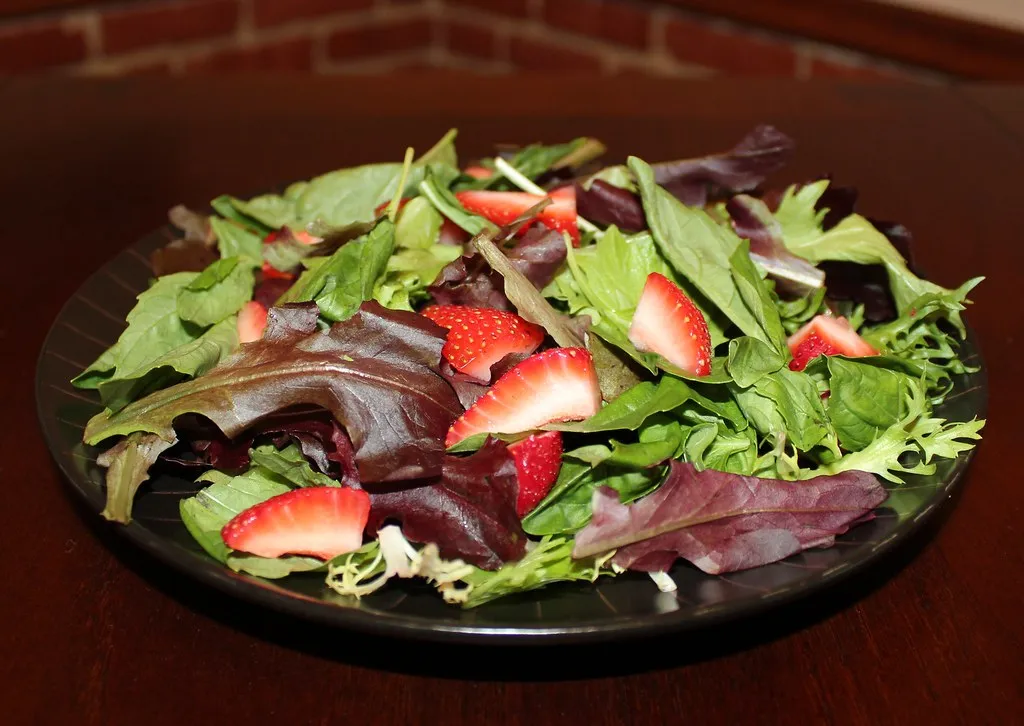
Follow these step-by-step instructions to prepare a flavorful, vitamin B-rich salad in just a few minutes!
Step 1: Choose a Leafy Green Base (Folate-Rich Foundation)
Leafy greens are a fantastic source of folate (B9), fiber, and antioxidants. They also serve as the perfect base for your salad, adding freshness and texture.
Best leafy greens for a vitamin B-packed salad:
- Spinach – High in folate, iron, and vitamin C.
- Kale – A powerhouse of B9, fiber, and minerals.
- Romaine lettuce – Light, crunchy, and rich in folate.
- Swiss chard – Packed with B vitamins and antioxidants.
How to prepare: Wash the greens thoroughly, pat them dry, and chop them into bite-sized pieces. Mix different greens for a variety of flavors and textures.
Step 2: Add a Protein Source (B12 & B6 for Energy)
Protein is essential for muscle repair, metabolism, and overall vitality. Many animal and plant-based proteins are rich in B6 and B12, helping support red blood cell production and nervous system function.
Best protein options for your salad:
- Grilled chicken – High in B6 and niacin (B3) for energy production.
- Salmon or tuna – Loaded with B12 and omega-3 fatty acids for brain health.
- Hard-boiled eggs – A great source of B12 and biotin (B7) for hair and skin health.
- Tofu or tempeh – Plant-based proteins rich in B6 and B3.
How to prepare: Cook and season your protein of choice, then slice it into bite-sized pieces before adding it to your salad.
Step 3: Incorporate Whole Grains & Legumes (B1, B6 & B9 for Fiber & Energy)
Whole grains and legumes are excellent plant-based sources of B vitamins, providing sustained energy and keeping you full for longer.
Best whole grains & legumes for a vitamin B-rich salad:
- Quinoa – Contains B6 and folate, plus it’s a complete protein.
- Lentils – Loaded with folate and iron, great for heart health.
- Chickpeas – High in B6 and fiber, aiding digestion.
- Black beans – Rich in B1 and folate, supporting nerve function.
How to prepare: Cook quinoa or lentils in advance and allow them to cool before tossing them into your salad. Canned chickpeas or black beans can be rinsed and drained for convenience.
Step 4: Sprinkle in Nuts & Seeds (B2, B3, B6 for Brain & Skin Health)
Nuts and seeds not only enhance the crunch and flavor of your salad, but they also deliver a rich dose of B vitamins, healthy fats, and antioxidants.
Best nuts & seeds for a vitamin B-rich salad:
- Sunflower seeds – High in B5 and B6, great for metabolism.
- Almonds – Contain B2 and B3, supporting skin health.
- Flaxseeds & chia seeds – Provide B vitamins and omega-3s.
- Pumpkin seeds – Rich in B vitamins, magnesium, and zinc.
How to prepare: Lightly toast the nuts and seeds for extra flavor, then sprinkle them over your salad for added texture and nutrients.
Step 5: Add a Dairy or Healthy Fat Source (B2 & B12 for Absorption & Creaminess)
Including healthy fats and dairy can help enhance vitamin absorption while adding richness and depth to your salad.
Best dairy & healthy fats for your salad:
- Cheese (Feta, Parmesan, Goat cheese) – Provides B2 and B12, essential for energy production.
- Greek yogurt – High in B12 and probiotics, great for gut health.
- Avocado – Contains B5, B6, and healthy fats for brain and skin health.
- Olive oil – A heart-healthy fat that enhances nutrient absorption.
How to prepare: Dice avocado, crumble cheese, or drizzle olive oil to enhance the flavor and texture of your salad.
Step 6: Prepare a Light & Flavorful Dressing (Enhances Taste & Nutrient Absorption)
A good salad dressing ties all the ingredients together and improves the absorption of fat-soluble vitamins (like A, D, E, and K) from your greens and vegetables.
Simple homemade vitamin B-friendly dressing:
- 3 tbsp olive oil – Healthy fat for nutrient absorption.
- 1 tbsp lemon juice or apple cider vinegar – Boosts digestion and flavor.
- 1 tsp Dijon mustard – Adds depth and enhances metabolism.
- 1 clove garlic, minced – Aids immune support and digestion.
- Salt & black pepper to taste – Enhances flavor naturally.
How to prepare: Whisk all the ingredients together in a small bowl, then drizzle over your salad before tossing everything together.
Step 7: Assemble & Enjoy Your Vitamin B-Rich Salad!
Once all your ingredients are prepped, it’s time to assemble your salad for a nutrient-packed, delicious meal.
Final Assembly Steps:
- Start with the leafy greens as your base.
- Layer on your proteins, grains, legumes, and nuts for texture and nutrition.
- Drizzle your homemade dressing over the salad.
- Toss everything together gently to coat all ingredients evenly.
- Garnish with fresh herbs or seeds for an extra burst of flavor.
Health Benefits of Eating a High-Vitamin B Salad Regularly
Incorporating a salad recipe high in vitamin B into your daily diet is one of the best ways to support overall health. Since B vitamins play a crucial role in energy production, brain function, and metabolism, eating a nutrient-dense salad regularly ensures your body gets the essential vitamins it needs to function optimally. Scientific research highlights the importance of B vitamins in maintaining overall well-being, from reducing inflammation to supporting red blood cell production. If you want to explore more about how vitamin B benefits the body, check out this collection of research articles on PubMed.
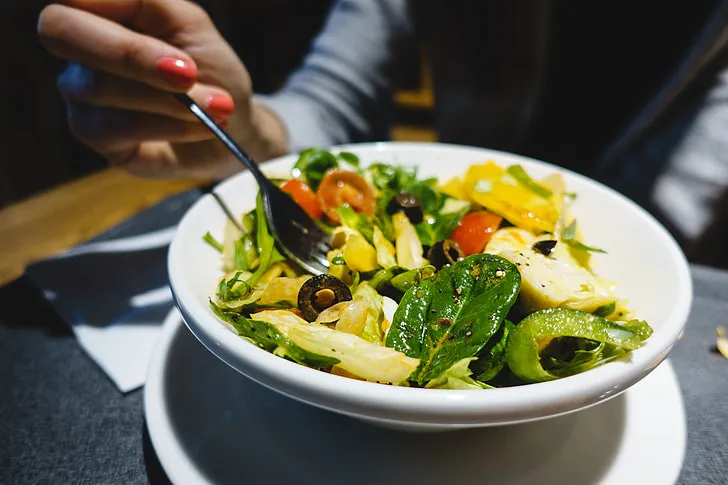
Let’s explore the top health benefits of consuming a vitamin B-rich salad on a regular basis!
1. Boosts Energy Levels and Reduces Fatigue
If you often feel tired or sluggish, B vitamins are essential for converting the food you eat into usable energy. Specifically, vitamins B1 (thiamine), B2 (riboflavin), B3 (niacin), B5 (pantothenic acid), and B6 (pyridoxine) help break down carbohydrates, proteins, and fats, ensuring your body produces enough ATP (energy molecules).
How a high-vitamin B salad helps:
- Whole grains like quinoa and brown rice provide B1 and B3, which help fuel your body.
- Leafy greens such as spinach and kale supply B9 (folate) to aid energy metabolism.
- Proteins like chicken, eggs, or tofu contribute to B6, which supports neurotransmitter production and energy balance.
Regularly eating a vitamin B-rich salad can help fight fatigue and keep you energized throughout the day.
2. Supports Brain Health and Cognitive Function
B vitamins play a key role in maintaining brain health, improving memory, and reducing the risk of cognitive decline. Vitamins B6, B9 (folate), and B12 are particularly important for brain function, as they help produce neurotransmitters like serotonin, dopamine, and norepinephrine.
How a high-vitamin B salad helps:
- Avocados and sunflower seeds are rich in B6, which helps regulate mood and reduce stress.
- Eggs, cheese, and Greek yogurt contain B12, crucial for maintaining healthy nerve cells and cognitive function.
- Lentils and chickpeas are packed with folate (B9), which helps prevent brain fog and supports mental clarity.
Regularly consuming a vitamin B-rich salad may help sharpen focus, improve memory, and even lower the risk of neurological disorders like Alzheimer’s disease.
3. Promotes Healthy Skin, Hair, and Nails
B vitamins contribute to radiant skin, strong nails, and healthy hair growth by supporting cell regeneration and collagen production. Specifically, B2 (riboflavin), B3 (niacin), B5 (pantothenic acid), B7 (biotin), and B12 are essential for maintaining healthy skin and hair.
How a high-vitamin B salad helps:
- Almonds and sunflower seeds provide B2 and B7, which strengthen hair and nails.
- Salmon and eggs offer B12 and biotin, which promote hair growth and prevent breakage.
- Greek yogurt and avocado contain B5 and B6, which help keep skin hydrated and glowing.
Eating a vitamin B-packed salad regularly can help improve skin elasticity, reduce acne, and promote healthier hair growth.
4. Enhances Heart Health and Circulation
B vitamins are essential for maintaining a healthy heart, as they help regulate homocysteine levels, a key factor in heart disease. Vitamins B6, B9 (folate), and B12 work together to prevent the buildup of excess homocysteine, which can lead to blood clots, artery damage, and cardiovascular problems.
How a high-vitamin B salad helps:
- Leafy greens like kale, romaine, and Swiss chard provide B9 (folate), which reduces homocysteine levels.
- Beans, lentils, and chickpeas are rich in B6, which supports red blood cell production and circulation.
- Salmon, tuna, and eggs are excellent sources of B12, essential for maintaining healthy blood vessels.
Including vitamin B-rich salads in your diet can help lower the risk of heart disease, improve circulation, and support overall cardiovascular health.
5. Supports a Healthy Metabolism and Weight Management
If you’re looking to maintain a healthy weight, B vitamins play a key role in regulating metabolism, digestion, and fat storage. These vitamins help your body efficiently break down proteins, fats, and carbohydrates for energy rather than storing them as excess fat.
How a high-vitamin B salad helps:
- Quinoa and whole grains provide B1 and B3, which enhance carbohydrate metabolism.
- Leafy greens and nuts are rich in B9 (folate), which supports healthy digestion.
- Chicken, tofu, and dairy supply B6 and B12, which promote fat metabolism and prevent muscle loss.
Eating a vitamin B-rich salad can help improve digestion, boost metabolism, and support weight loss efforts.



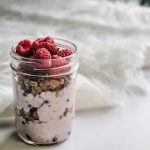

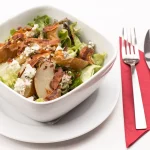
[…] For more healthy salad ideas that incorporate nutrient-packed ingredients, you might enjoy this Fast Prep Kitchen article on a salad recipe that’s high in vitamin B, perfect for boosting your daily nutrient intake. Fast Prep Kitchen: Salad Recipe High in Vitamin B. […]
magnificent issues altogether, you simply received a new reader. What may you recommend about your post that you made some days ago? Any positive?